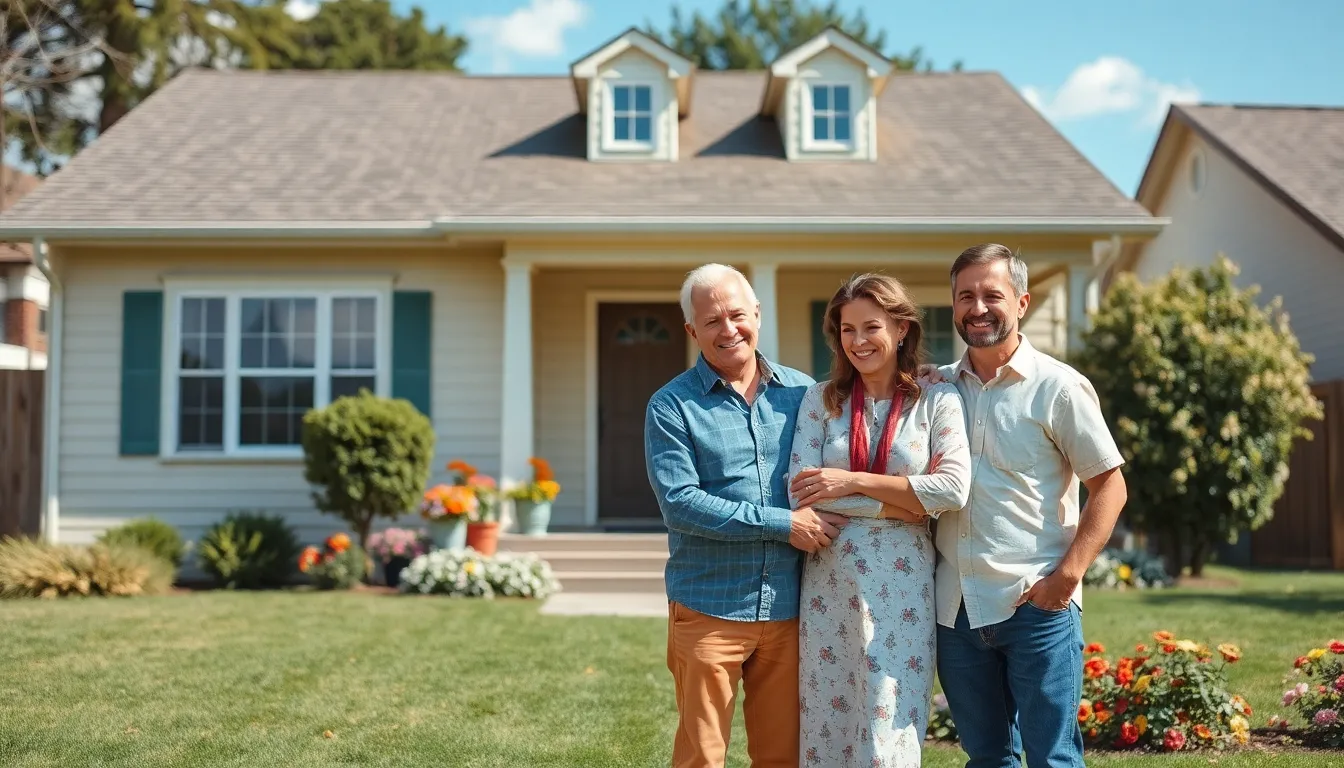Homeownership isn’t just a dream; it’s the ultimate adulting milestone. Imagine having a space that’s entirely yours, where you can decorate without worrying about your landlord’s opinion on that neon green accent wall. It’s not just about the freedom to paint; it’s about building equity, stability, and a place to call home.
Table of Contents
ToggleOverview of Homeownership
Homeownership represents a significant milestone in adulthood. This achievement provides individuals and families with the security and stability often sought in life. Owning a home allows for personal freedom, like choosing décor and making renovations without external approval.
Equity builds over time, making homeownership a solid investment. According to the Federal Reserve, approximately 70% of homeowners see an increase in their property’s value after ten years. This appreciation contributes to financial stability and wealth accumulation, differentiating homeowners from renters.
Communities also benefit from increased homeownership rates. Higher ownership levels often lead to stronger neighborhood ties, resulting in more invested local residents. Neighborhoods with consistent homeownership typically report lower crime rates and higher overall satisfaction.
Owning a home fosters a sense of belonging and pride. Individuals invest not just financially but emotionally in their properties, which often leads to long-term residency. Moreover, homeownership enables families to create lasting memories in a space they can truly call their own, enhancing their overall quality of life.
Homeownership encapsulates benefits beyond financial gains. It provides personal freedoms, builds equity, strengthens communities, and enhances the homeowner’s lifestyle. These advantages underscore the essential role of homeownership in achieving stability and fulfillment.
Benefits of Homeownership

Homeownership presents various benefits that enhance financial stability and personal fulfillment. Individuals often experience significant advantages in both financial and emotional aspects when they own a home.
Financial Advantages
Homeownership provides numerous financial benefits. Property value typically appreciates over time, with around 70% of homeowners seeing an increase in their home’s worth after ten years. Homeowners build equity, allowing them to invest in their future. Fixed-rate mortgages offer predictability in monthly payments, unlike variable rental costs. Tax benefits also exist, as mortgage interest is often deductible. Overall, these financial incentives contribute significantly to long-term wealth accumulation, differentiating homeowners from renters.
Emotional and Social Benefits
Homeownership fosters emotional well-being and strengthens community ties. It instills a sense of pride and belonging, allowing families to create lasting memories in their own spaces. Stability and security often accompany owning a home, giving individuals a feeling of control over their environment. Neighbors usually form stronger connections, contributing to lower crime rates and higher satisfaction within communities. The emotional comfort of a personalized home enhances quality of life, making homeownership a fulfilling pursuit.
Challenges of Homeownership
Homeownership presents several challenges that potential or current owners should consider. Understanding these difficulties can help in making informed decisions.
Maintenance and Responsibilities
Maintenance demands regular attention. Homeowners must tackle tasks such as landscaping, plumbing repairs, and appliance upkeep. They rely on their skills or hire professionals to ensure everything operates efficiently. Furthermore, homeowners bear financial responsibility for these tasks, leading to unplanned expenses. Routine inspections become necessary to prevent minor issues from escalating into substantial problems. Lack of attention may diminish property value, illustrating the importance of diligent maintenance practices.
Market Fluctuations
Market fluctuations can significantly impact property values. Housing markets may surge, but they can also decline unexpectedly. Economic conditions influence these changes, affecting demand and pricing. Homeowners might find that their property’s value does not appreciate as anticipated. Selling during a downturn can lead to financial losses, complicating the investment. Awareness of local market trends aids in making strategic decisions related to buying or selling a home, emphasizing the importance of market knowledge in maintaining financial stability.
Types of Homeownership
Understanding the various types of homeownership aids in making informed decisions. Each type comes with unique benefits and responsibilities.
Single-Family Homes
Single-family homes represent independent residences, offering complete ownership and control. Homeowners can modify their property as desired, from renovations to landscaping. Typically, these homes appreciate in value, promoting long-term investment stability. Maintenance responsibilities rest solely with the owner, which includes upkeep and repairs. Additionally, single-family homes often provide more space, appealing to families seeking a personal sanctuary. These homes also contribute positively to community dynamics, fostering neighborhood pride and security.
Condominiums and Townhomes
Condominiums and townhomes offer a distinct alternative to single-family homes. They involve shared ownership of common areas, such as pools and gardens, which often come with homeowners’ associations. Owners enjoy lower maintenance responsibilities, as exterior upkeep is typically managed by the association. Purchasing a unit in a condo or townhome can be more affordable, making it accessible for first-time buyers. Residents often experience a strong sense of community, thanks to the close proximity of neighbors. These properties also provide various amenities that enhance living experiences, from gyms to social lounges.
Financing Homeownership
Financing homeownership involves various options and assistance programs designed to help individuals achieve their dream of owning a home. Understanding these options is crucial for making informed decisions.
Mortgage Options
Many mortgage options cater to different financial situations. Conventional loans, backed by private lenders, require good credit and a down payment of 5% to 20%. FHA loans, insured by the Federal Housing Administration, offer lower down payments around 3.5% but entail mortgage insurance. VA loans, available to veterans and active service members, enable no down payment and do not require private mortgage insurance. Additionally, USDA loans assist low-to-moderate-income buyers in rural areas, allowing for zero down payment. Exploring these choices can significantly impact the affordability of homeownership.
Government Assistance Programs
Government assistance programs provide crucial support for prospective homeowners. First-time homebuyer programs often offer down payment assistance, grants, or favorable loan terms. The Home Possible program from Freddie Mac targets low-income buyers, while state-specific programs frequently include local grants or loans with reduced interest rates. HUD also runs the Good Neighbor Next Door program, enabling educators and law enforcement to buy homes at 50% off. Researching available options can help maximize financial resources and enhance chances of successful homeownership.
Homeownership stands as a pivotal achievement that offers both financial and emotional rewards. It empowers individuals to shape their living spaces and build equity over time. The sense of community and belonging that comes with owning a home enhances overall life satisfaction. While challenges exist such as maintenance responsibilities and market fluctuations, the long-term benefits often outweigh these concerns.
Understanding the different types of homeownership and available financing options can make the journey more accessible. With careful consideration and planning, prospective homeowners can embark on a fulfilling path that not only secures their financial future but also enriches their lives.








